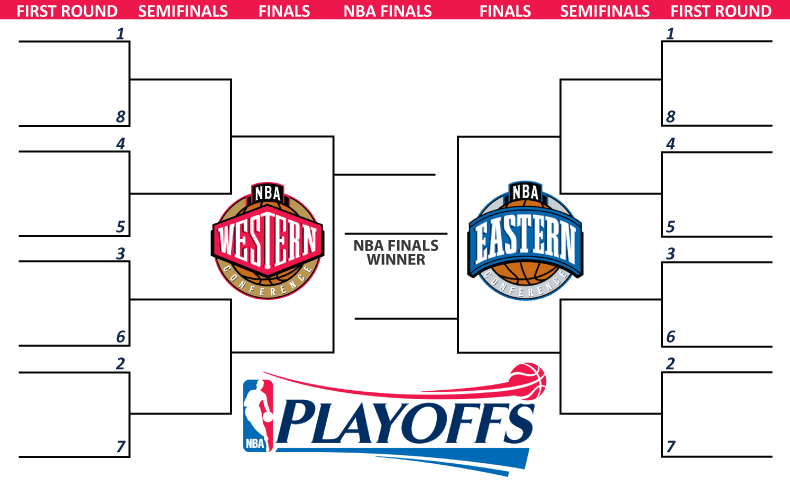
Question: “Can I reliably predict which team will advance to the next round of the Playoffs by leveraging teams’ regular-season matchup records?”
Before entering the Playoffs, each team has opportunities play against every other team in the league (3 or 4 games against teams in the same Conference and 2 games against teams in the other Conference, in the current format).
I wanted to see if I could leverage this regular-season matchup information to determine which team would win the Playoffs matchup.
I decided to perform a simple back-test with the following logic:
- If a team won more games against its opponent during the regular season, then expect that it will beat its opponent and advance to the next round in the Playoffs.
- If a team lost more games against its opponent during the regular season, then expect that it will lose to its opponent and fail to advance to the next round in the Playoffs.
- If a team’s win tally is equal to its loss tally against its opponent during the regular season, then don’t make any expectations about which team will win and advance to the next round in the Playoffs.
For this back-test, I used NBA games data from the 1979-80 season through 2016-17 season.
The year-over-year accuracies varied, but the overall prediction accuracy for this back-test was 70%. Meaning, if we predicted that whichever team that had a higher matchup win records during the regular season would win the Playoffs matchup, then we would have been right 70% of the times.
This is a fascinating result, provided that I didn’t account for any other variables, such as player injuries, that most likely would have occurred during the progression of regular seasons.
There were even two seasons (1987-88 and 2004-05 seasons), in which the back-test recorded 100% accuracy. That means that during those seasons, teams that had higher regular-season matchup wins won against their opponents in the Playoffs 100% of the times.
That’s truly fascinating, if you ask me.
| Season | Number Correct | Number Incorrect | Number Skipped | Accuracy |
|---|---|---|---|---|
| 1979-80 | 12 | 2 | 8 | 0.86 |
| 1980-81 | 10 | 6 | 6 | 0.62 |
| 1981-82 | 10 | 8 | 4 | 0.56 |
| 1982-83 | 12 | 4 | 6 | 0.75 |
| 1983-84 | 8 | 12 | 10 | 0.40 |
| 1984-85 | 14 | 4 | 12 | 0.78 |
| 1985-86 | 24 | 2 | 4 | 0.92 |
| 1986-87 | 14 | 8 | 8 | 0.64 |
| 1987-88 | 22 | 0 | 8 | 1.00 |
| 1988-89 | 16 | 8 | 6 | 0.67 |
| 1989-90 | 18 | 4 | 8 | 0.82 |
| 1990-91 | 14 | 4 | 12 | 0.78 |
| 1991-92 | 14 | 8 | 8 | 0.64 |
| 1992-93 | 12 | 8 | 10 | 0.60 |
| 1993-94 | 16 | 6 | 8 | 0.73 |
| 1994-95 | 16 | 8 | 6 | 0.67 |
| 1995-96 | 20 | 6 | 4 | 0.77 |
| 1996-97 | 12 | 8 | 10 | 0.60 |
| 1997-98 | 12 | 10 | 8 | 0.55 |
| 1998-99 | 12 | 12 | 6 | 0.50 |
| 1999-00 | 6 | 6 | 18 | 0.50 |
| 2000-01 | 14 | 4 | 12 | 0.78 |
| 2001-02 | 14 | 6 | 10 | 0.70 |
| 2002-03 | 8 | 8 | 14 | 0.50 |
| 2003-04 | 16 | 8 | 6 | 0.67 |
| 2004-05 | 18 | 0 | 12 | 1.00 |
| 2005-06 | 14 | 10 | 6 | 0.58 |
| 2006-07 | 18 | 6 | 6 | 0.75 |
| 2007-08 | 14 | 2 | 14 | 0.88 |
| 2008-09 | 22 | 2 | 6 | 0.92 |
| 2009-10 | 16 | 8 | 6 | 0.67 |
| 2010-11 | 18 | 8 | 4 | 0.69 |
| 2011-12 | 18 | 10 | 2 | 0.64 |
| 2012-13 | 14 | 6 | 10 | 0.70 |
| 2013-14 | 10 | 6 | 14 | 0.62 |
| 2014-15 | 18 | 4 | 8 | 0.82 |
| 2015-16 | 18 | 8 | 4 | 0.69 |
| 2016-17 | 18 | 4 | 8 | 0.82 |
The code for this analysis can be found on my Github repository.

